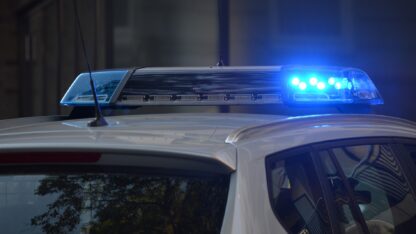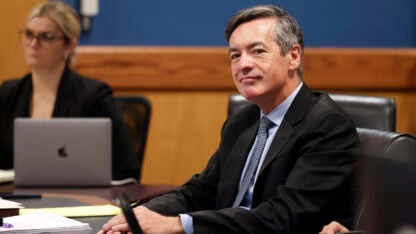Of all the perks of being president, Donald Trump may soon miss most the legal protection that it affords.
For the past four years, Trump has benefitted from the de facto immunity from prosecution that all presidents enjoy while in office. But that cloak will pass to Joe Biden when he’s sworn in on Jan. 20, leaving Trump out in the legal cold.
“Clearly, the president enjoyed immunity when he was in office,” said Danya Perry, a former state and federal prosecutor in New York. “And it’s possible, as a matter of law, that he could be indicted on January 21.”
There’s no indication that an indictment is imminent, and it’s possible that Trump could emerge entirely unscathed. But there’s also no doubt that once he’s out of office, he’ll be facing a higher level of legal jeopardy than he has in years.
“His legal risks increase immeasurably come Jan. 21st, both on the civil and the criminal side,” Perry said.
Potential federal liability
The most developed case that could ensnare Trump might be out of the Southern District of New York. It stems from the federal prosecution against Michael Cohen, Trump’s onetime personal attorney and fixer.
Cohen pleaded guilty to a range of crimes, including arranging illegal hush-money payments to keep women silent during the 2016 campaign about extramarital affairs they say they had with Trump.
Cohen has said he acted at the direction of and in coordination with Trump. Prosecutors, meanwhile, referred to the president in court papers as “Individual 1.”
It is Justice Department policy that a sitting president cannot be indicted. So although it’s possible for a president to break the law before or during their time in office, prosecutors’ inability to seek an indictment effectively means he can’t be accused, tried or punished while still in office.
Cohen’s wrongdoing, which prosecutors tied to Trump without naming him, raises the question as to whether Trump might face charges of his own.
“Ordinarily, had the target not been a sitting president with immunity, I think ‘Individual 1,’ as he’s referred to, very likely would have been prosecuted along with his aider and abettor, Michael Cohen,” Perry said.
Uncharted waters
There could be significant complications to pursuing such a case, however.
For one, prosecuting a former president would be politically fraught, particularly in a country as divided as this one. The decision on whether to do so at the federal level will fall to the new administration.
“It comes down to a political calculation,” said Kim Wehle, a former federal prosecutor who now teaches at the University of Baltimore School of Law.
“And the understanding is President-elect Biden has already signaled he doesn’t have an appetite for that, which makes sense given he has a lot of political capital that needs to be used on critical issues like the pandemic, like climate change, like the economy.”
Biden has indeed signaled his reluctance to pursue a case against his predecessor. In August, Biden said he’d leave the decision to the Justice Department and the attorney general, but suggested pursuing charges might do more damage than good.
“I think it is a very, very unusual thing and probably not very, how can I say it, good for democracy to be talking about prosecuting former presidents,” Biden said.
There’s also the possibility that Trump could attempt to pardon himself before leaving office. The president has asserted he has that power but said in the past he didn’t feel he needed to use it because he argues he hasn’t broken any law.
An attempt at a self-pardon would be an unprecedented move and could very well face legal challenges.
The City and State of New York
What is clear about Trump’s pardon power, however, is that it does not extend to crimes at the state level. And that could prove problematic for Trump in his former hometown.
Manhattan District Attorney Cy Vance has an active criminal investigation into Trump and his businesses. The exact contours of the probe are not clear, but court papers suggest he’s investigating possible insurance or financial fraud.
“That looks like it’s the most likely place where he could have some criminal liability around taxes, for example,” Wehle said.
The case has been tied up for months as Trump fights a grand jury subpoena that Vance issued to Trump’s personal accounting firm. Vance’s office is seeking eight years of Trump’s tax returns and financial records.
The president fought the subpoena all the way to the Supreme Court last summer and lost, although the high court left the door open for him raise other legal challenges.
Trump did so, arguing that the subpoena was overly broad and politically motivated. Vance rejected those claims, and lower courts agreed with the DA’s office. Trump’s lawyers are now asking the Supreme Court to block the subpoena.
Wehle said the patience Vance’s team has shown in litigating its subpoena case suggests the probe isn’t simply political — a Democratic city official in New York playing to the crowd there.
“It’s hard to imagine that Cyrus Vance would have put this kind of effort into investigating Donald Trump while he was president if he was just going to drop that investigation and anything that could come out of that when he is a private citizen like anyone else,” Wehle said.
The Vance case is not the only legal trouble brewing in New York.
The state attorney general, Letitia James, is conducting a civil investigation into the Trump businesses. James is looking into whether the Trump Organization improperly inflated the value of its assets for loan or insurance purposes, and then deflated the value for tax purposes.
The president’s son, Eric Trump, reportedly was deposed under oath last month as part of the probe.
While James’ investigation is a civil one, it could cross over to the criminal side depending on what investigators uncover.
According to Perry, the former New York prosecutor, both of the probes could be relatively straightforward because they are likely based heavily on documents.
“If you’re looking at several assets, for example, and different values are attributed to them, one in a tax return and another in a bank loan document, that might be relatively simple,” she said. “They do seem to be very paper based.”
Cohen alleged in congressional testimony that Trump’s businesses engaged in such practices.
But there are significant challenges in criminal tax cases, Perry said, because a sprawling business’ returns can be complicated, and prosecutors have to prove that people involved willfully broke the law.
“To prove that the taxpayer here, Mr. Trump himself, has committed intentional, willful tax fraud can be difficult and it doesn’t necessarily fly off the pages of the tax returns,” Perry said. “A cooperating witness is always very helpful for that.”
It isn’t clear whether Cohen or other sometime aides of Trump might be in a position to appear in a criminal case and testify as to the boss’s actions or intentions.
And Trump’s legal jeopardy does not end there.
He also faces defamation lawsuits filed by two women who say he sexually assaulted them. While Trump doesn’t face criminal liability in those suits, he does face potential damage to his reputation and financial repercussions.
In all, it adds up to a legally perilous—and potentially expensive—post- presidency.
“It’s a potential avalanche,” Wehle said. “But this is, again, a man that is very used to using the legal system it his advantage.”
Copyright 2020 NPR. To see more, visit https://www.npr.org.
9(MDAxODM0MDY4MDEyMTY4NDA3MzI3YjkzMw004))

9(MDAxODM0MDY4MDEyMTY4NDA3MzI3YjkzMw004))








